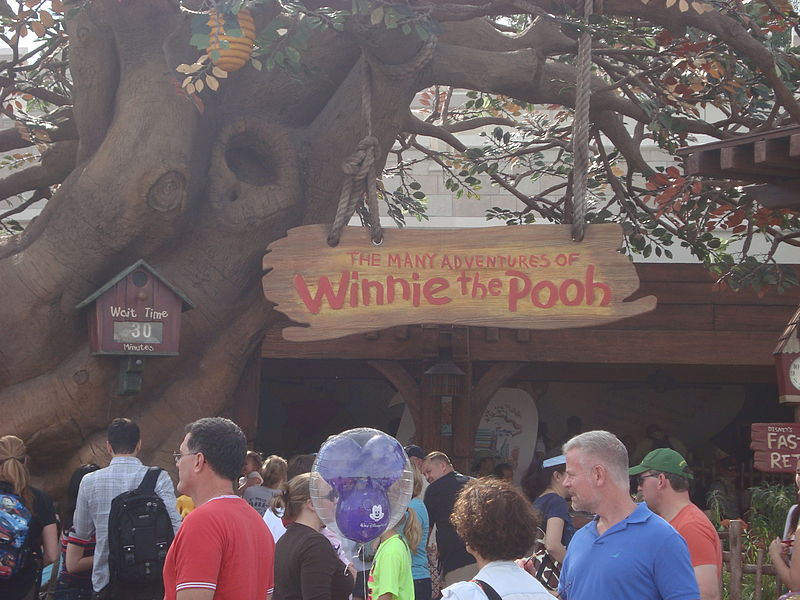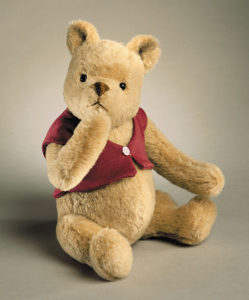Daniel Anderson
Disney has Kept Pooh Weird, and for that we should all be thankful.
In this age of cinematic reboots, we have all become accustomed to “updates” of older stories, that typically impose winking, ironic jokes upon the originals as this has proven to be a popular formula among audiences. It’s a safe economic bet for the studios, but it has led to a degree of predictability among such films, in both style and ideology.
For some reason, Disney has resisted this commercial urge with its Winnie-the-Pooh franchise, both in the 2011 Winnie-the-Pooh and its latest entry, Christopher Robin. Both films feel downright old-fashioned and weirdly unlike most modern animated films. In fact, even the animation itself of Christopher Robin stands out as distinctive. The animals look neither like Pixar computer animations nor Coraline-esque claymations. They simply appear to be stuffed animals walking around with us humans. This provides a rather uncanny, disorienting experience for the viewer, as the characters seem to manifest straight out of our nostalgic past.
Not that nostalgia is virtue in itself. Pandering to dated sensibilities is no less crass than pandering to new ones. No, what makes Christopher Robin such a compelling film is not that it seeks to Make Childrens’ Cinema Great Again. Quite the opposite. The film’s obstinate weirdness lets it boldly step outside our social and economic norms and create a beautiful space, “in that enchanted place at the top of the forest” in which we can see just how off the rails we’ve gone as a society. It’s for this reason that the enduring peculiarity of Pooh is such a blessing. The Hundred Acre Wood remains unspoiled by the new and gives a clear picture of the now.
Winnie-the-Pooh’s latest adventure is perhaps darker than many viewers might expect, however it is not the kind of darkness reboots often employ to appear edgy and important (see the controversy over DC’s recent trailer for Titans). Here, the film uses tragedy to tell a story of redemption.
The ending of the classic Many Adventures of Winnie-the-Pooh, in which Christopher Robin leaves the Hundred Acre Wood to begin school, attempted to reconcile the sadness of leaving innocent childhood behind with a kind of excitement about entering the world of adult responsibility and achievement. It sought to make this transition into the world of work wholly natural, so if it’s a bit sad, so be it. It is the accepted way of the world. Somehow, I’ve always felt that the ending underplayed the tragedy of the situation however. Christopher seems neither happy nor sad about having to learn his ABC’s and such; he’s mainly resigned to it, as are his stuffed friends. Little is said about giving up “being” for “doing.”
This omission is what motivates Christopher Robin. The film makes it clear that the innocence of “doing nothing” in the Wood had been wholly abandoned by Christopher Robin, left behind with Pooh, Piglet, and friends, and not brought with him as a restorative tool into his life of responsibility in the “real world.” Christopher Robin picks the story up here, and actively seeks to drag our lost childhood hero (and subsequently us) back into the enchanted world of his innocence. An abrupt exit from our materialistic world is the only path to redemption for our lost Christopher.

The world of adult responsibility is not a happy one for Christopher as is made clear by an opening montage of his life in fast motion (a darker, more melancholy version of the opening sequences of Up, in many ways). The harsh demands of Christopher’s boarding school, the loss of a parent, war, difficult work that keeps him from his family: these are the “something” of adulthood that replace the “nothing” of his sweet childhood. And the tragedy is compounded by the fact that Christopher has fallen so far from his early happiness by doing everything seemingly right. He truly loves his wife and daughter, he works hard, and he has a strong sense of responsibility for others, all seemingly unassailable virtues. And yet as the film opens, the adult Christopher Robin has been transformed by the machinery of society into someone Pooh barely can recognize. Even Christopher’s essential philosophy of the value of doing nothing is perverted by his odious boss, who puts the idea into Christopher’s head that “something can’t come from nothing,” which Robin eventually internalizes, to his own misery.
With brutal honesty, the film shows us what our world has done to dear Christopher, and in doing so, it begs the Christian to recognize that much of what we call natural, is in fact destructive and idolatrous. Christopher’s pursuit of what the world defines as The Good poisons all his pursuits. In seeking to provide for his family, he deprives them of his presence. The duties of his managerial work force him to think of his friends as not really friends, but “people who depend on him.” His kindly neighbor constantly dangles friendship in front of him, but is repeatedly rebuffed as a nuisance interrupting Christopher’s busy life. Tragically, Christopher Robin’s life seemingly proves Adorno’s adage that a “wrong life cannot be lived rightly.”
Opening with this rather bleak note, the film is subsequently about the redemption of Christopher Robin. Pooh, who wakes up one morning unable to find any of his friends, goes looking for Christopher Robin through a magic door in the tree in which Christopher disappeared into those many years ago. Pooh magically finds him in London, marking the beginning of the adventure. And it is the magic that is important. Remember, Pooh exists entirely outside the logic of our world, and this alienness, this total break, is Robin’s only hope. Christopher, unfortunately yet predictably, finds Pooh to be an irritating distraction from his work and seeks to return him to the Hundred Acre Wood so he can get back to doing his all-important “somethings.” This journey reintroduces Christopher to all his old friends and effectively “re-enchants” Robin’s disenchanted life.
James K. A. Smith’s ongoing “Cultural Liturgies” project has explored in tremendous detail the ways in which the secular world is made up of liturgies that orient each of us, Christians included, away from the Kingdom. We fall into the patterns set forth by these cultural practices without even realizing it. They present themselves as natural and therefore good, and well-meaning people allow these unseen worship practices to corrupt their imaginations and lives. Smith argues that the Church and its ancillary institutions must provide effective counter-liturgies to reorient the Christian toward the Kingdom and its Good. Smith’s work provides a powerfully instructive way of describing what Pooh’s irrational innocence does for Christopher Robin. Significantly, Robin must be forced out of the world of pointless somethings and back into the magical world of productive nothings in order to find redemption. The rituals and liturgies of capitalism and modern masculinity have corrupted his very imagination about the world and what it should be. His return to the Hundred Acre Wood effectively provides a countercultural set of liturgies that ultimately reorient Christopher Robin to the true Good, thus redeeming his life.

The disastrous effects of our idolization of work and achievement are becoming increasingly apparent. Malcolm Harris’s recent book, Kids These Days, explores how the much-maligned Millennial generation has suffered under an ideology quite like that experienced by Christopher Robin after entering what we call the “real world.” A deeply imbedded distrust of institutions is one potentially disastrous effect of what the world has done to this generation in the mad dash for productivity and profit. In an excellent review of the book for Commonweal Magazine, John Thornton Jr. poses the book’s essential question as follows: “What happens when people at increasingly younger and younger ages are trained to consider every aspect of their lives as investments meant to bring a monetary return?” Thornton smartly applies that piercing question to the youth at his own church, as we all should, since there is no reason to believe that the rate of monetizing our children is slowing down by itself. Regardless, Harris’s book demonstrates that the tragic fable of Christopher Robin’s post-Hundred Acre Wood life is all too real in the social and economic world we’ve created and called good.
By the film’s end, the beloved characters from the Hundred Acre Wood have reinvigorated the “real world” with their subversive magic that exposes our tyrannical idolatry of work. And Christopher Robin has seemingly dedicated himself to taking time periodically to bring his family back to his enchanted Eden for much needed breaks from the world’s poisonous patterns. For the believer, this practice resembles coming together with other Christians for the liturgies of Church. Which can break us away from our “somethings” long enough for us to rest in the grace of having to do nothing at all.
Daniel Anderson is Assistant Professor of English/Fine Arts Department at Mount Aloysius College where he teaches a range of Rhetoric, Literature, and Film classes at the Mount, including classes on the Jewish American Novel, Flannery O’Connor, Shirley Jackson, Franz Kafka, the Literature of Pittsburgh, and the Classic Horror Film. He also produces and hosts the Sectarian Review Podcast, which investigates art, culture, politics, and religion.
